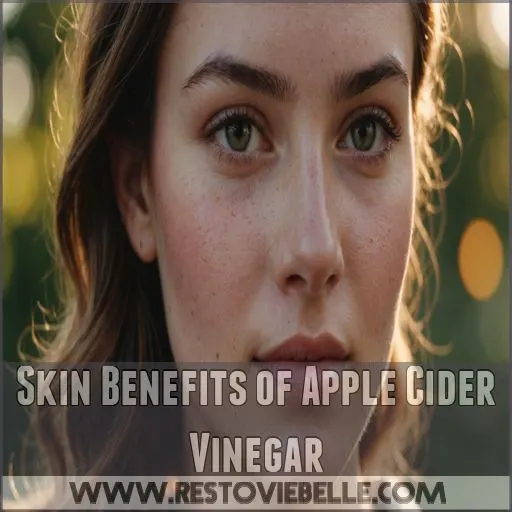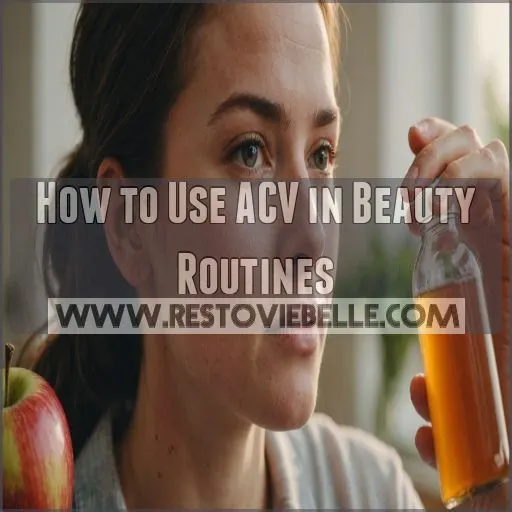This site is supported by our readers. We may earn a commission, at no cost to you, if you purchase through links.

This fermented marvel balances your skin’s pH, banishes blemishes, and lifts away dull cells for a radiant glow.
The acetic acid in ACV is a natural disinfectant, battling acne-causing bacteria, while the malic acid exfoliates and brightens.
It also seals your hair cuticles, enhancing shine and smoothness.
Plus, ACV’s clarifying properties clear out product buildup and nourish your scalp, reducing dandruff, making it a great way to get your glow on.
Just remember to dilute it properly – a little ACV goes a long way!
Table Of Contents
- Key Takeaways
- What is Apple Cider Vinegar?
- Skin Benefits of Apple Cider Vinegar
- Hair and Scalp Advantages of ACV
- How to Use ACV in Beauty Routines
- Potential Side Effects and Precautions
- Frequently Asked Questions (FAQs)
- Is apple cider vinegar good for You?
- Can you use apple cider vinegar for skin?
- What is apple cider vinegar & how does it work?
- Is apple cider vinegar good for hair?
- What does apple cider vinegar do to your face?
- What does apple cider vinegar do for a woman’s body?
- How long does it take to see results from apple cider vinegar on face?
- Does drinking apple cider vinegar make your skin glow?
- Does apple cider vinegar improve metabolism for weight loss?
- Can apple cider vinegar treat yeast infections or UTIs?
- Is apple cider vinegar effective for treating warts or moles?
- Can apple cider vinegar improve kidney or liver function?
- Does apple cider vinegar have antibacterial properties for wound healing?
- Conclusion
Key Takeaways
- Apple cider vinegar is a skin and hair powerhouse, helping to balance your skin’s pH, banish blemishes, and leave your locks shiny and smooth. Just be sure to dilute it properly – a little ACV goes a long way.
- Harness the power of acetic and malic acids in ACV to cleanse your pores, exfoliate dead skin, and fade dark spots for a refreshed, radiant complexion. However, go easy on sensitive skin to avoid irritation.
- Do you have dull, lifeless hair? ACV is to the rescue. This natural clarifier removes product buildup, balances your scalp’s pH, and boosts shine and smoothness. Use an ACV rinse 2-3 times a week for a lustrous, healthy head of hair.
- When using ACV, always dilute it first and do a patch test to check for any irritation or allergic reactions. Moderation is key: too much ACV can disrupt your skin’s pH and leave your scalp dry and itchy.
What is Apple Cider Vinegar?
You’ve probably seen apple cider vinegar (ACV) on grocery store shelves, but did you know it’s a beauty powerhouse?
This tangy liquid, made from fermented apple juice, is packed with beneficial compounds like acetic and malic acids that can work wonders for your skin and hair, particularly with its beneficial compounds and beauty powerhouse properties.
Fermentation Process of Apple Cider Vinegar
From apple to elixir, the journey of apple cider vinegar begins with a two-step fermentation dance. First, yeast transforms apple juice into cider through alcoholic fermentation . Then, acetic acid bacteria take the stage, turning cider into vinegar.
This process typically involves:
- Pressing apples into juice
- Adding yeast for alcohol production
- Introducing vinegar bacteria for acetic acid formation
Key Components: Acetic Acid and Malic Acid
You’ve heard about the fermentation process, but what’s the secret sauce in apple cider vinegar? It’s all about acetic acid and malic acid.
These powerhouse components are the real MVPs for ACV’s beauty benefits.
Acetic acid, the star player, packs a punch with its antimicrobial properties . Meanwhile, malic acid, an alpha-hydroxy acid (AHA), works its magic on your skin’s surface, gently exfoliating and brightening your complexion .
Nutritional Profile of Apple Cider Vinegar
After exploring acetic and malic acids, let’s unpack the nutritional profile of apple cider vinegar.
While it’s not a nutritional powerhouse, ACV does offer some surprising benefits:
- Contains small amounts of potassium for heart and muscle health
- Provides antioxidants to fight free radicals
- Offers
Differences Between Filtered and Unfiltered Varieties
When it comes to apple cider vinegar, the choice between filtered and unfiltered varieties can make a difference in your beauty routine.
Unfiltered ACV contains "the mother," a collection of beneficial bacteria and enzymes that offer additional health perks .
Let’s break down the key differences:
| Feature | Filtered ACV | Unfiltered ACV |
|---|---|---|
| Clarity | Clear | Cloudy |
| Nutrients | Fewer | More |
| Taste | Milder | Stronger |
| Price | Often cheaper | May cost more |
Skin Benefits of Apple Cider Vinegar
Apple cider vinegar might just be your skin’s best friend, bouncing your pH back to healthier levels.
It’s like giving your skin a quick pep talk, leaving it clearer, smoother, and a bit more confident about fighting blemishes.
Balancing Skin PH Levels
Your skin’s pH balance is like a delicate dance. Too high, and you’re inviting acne and dryness. Too low, and hello, irritation!
Apple cider vinegar (ACV) might just be your skin’s new BFF. Its natural acidity could help restore your skin’s protective barrier, keeping moisture in and pesky irritants out .
For eczema-prone folks, an ACV bath might be a game-changer in soothing those itchy flare-ups .
Exfoliating and Removing Dead Skin Cells
Over time, dead skin cells can accumulate, leaving your complexion dull and lifeless.
Apple cider vinegar’s natural acids act as a gentle exfoliant, sloughing away those pesky dead cells to reveal fresher, brighter skin underneath . Think of it as nature’s reset button for your face!
The acetic acid in ACV helps break down the "glue" holding dead cells together, promoting skin cell turnover without harsh scrubbing, and ultimately leading to a process of skin cell turnover .
Treating Acne and Reducing Blemishes
Now let’s tackle those pesky pimples! Apple cider vinegar’s acetic acid content might just be your skin’s new best friend. It’s got bacteria-fighting powers that could help zap acne-causing culprits . But hold your horses – ACV isn’t a miracle cure.
- It might sting a bit (ouch!)
- You could feel like a mad scientist mixing it up
- There’s a chance it’ll make your skin glow
- But it could also irritate sensitive skin
Minimizing Appearance of Pores
Apple cider vinegar can be your secret weapon in minimizing pores. Use it as a toner, mixed with water, to tighten and clear pores effectively. It’s like a natural shrink ray for those pesky skin eaters, balancing pH and keeping you radiant.
| Routine | Benefits | Alternatives |
|---|---|---|
| Toner | Tightens | Lemon Juice |
| Mask | Clarity | Baking Soda |
| Cleanser | Balance | Gel Cleanser |
Apply regularly and watch pores diminish!
Improving Overall Skin Tone and Texture
While pore-minimizing is great, let’s talk about your overall complexion. Apple cider vinegar’s magic touch extends beyond just spots and blemishes. It’s like a reset button for your skin, working to even out tone and refine texture.
- Exfoliates dead cells, revealing fresh skin
- Balances pH levels for a smoother appearance (Source)
- Brightens complexion with natural acids
You’ll love how your skin feels – smoother than a fresh apple!
Alleviating Symptoms of Eczema and Psoriasis
Your skin craves balance and relief, much like your morning coffee does after a long night.
Using diluted apple cider vinegar (ACV) might help with eczema and psoriasis, offering relief from itching and supporting the skin barrier.
Using this natural remedy, always patch test before diving into this natural remedy adventure .
Hair and Scalp Advantages of ACV
You might be surprised to learn that apple cider vinegar isn’t just for your salad dressing.
This versatile ingredient can work wonders for your hair and scalp, offering benefits from clarifying and balancing to promoting shine and strength.
Clarifying and Removing Product Buildup
Struggling with dull, lifeless hair due to product buildup? Apple cider vinegar (ACV) to the rescue! This natural clarifier gently removes residue, leaving your locks shiny and refreshed. Try an ACV rinse 2-3 times a week for a deep clean – your hair will thank you!
Key benefits include:
- Removes product buildup
- Restores hair’s natural shine
- Improves manageability
- Strengthens hair follicles
- Balances scalp pH
Balancing Scalp PH and Reducing Dandruff
After clearing the gunk from your hair, let’s tackle scalp health.
Using an ACV rinse can help maintain your scalp’s pH balance, reducing dandruff and even pesky yeast infections.
Just mix some ACV with water, and gently massage it in—your scalp will thank you. Remember, if it tingles too much, ease up a bit! This can be a sign that your scalp is particularly sensitive, so it may be helpful to dilute the ACV further with water or reduce the massage time to avoid any discomfort, or try an ACV with water mixture.
Enhancing Hair Shine and Smoothness
Dull hair got you down? Apple cider vinegar (ACV) might be your ticket to luscious locks. This natural wonder can boost shine and smoothness, leaving you with head-turning hair.
- Restores hair’s natural pH balance
- Seals hair cuticles for a silky finish
- Reduces frizz and flyaways
- Removes product buildup for a healthy shine
Try an ACV rinse after shampooing to reveal your hair’s natural radiance .
Strengthening Hair Follicles
The secret to luscious locks might be hiding in your pantry.
Apple cider vinegar (ACV) isn’t just for salad dressings – it’s a powerhouse for your hair follicles too. ACV’s antimicrobial properties can help combat scalp infections that weaken hair .
By maintaining a healthy scalp environment, you’re giving your follicles the TLC they need to stay strong. Plus, ACV’s ability to balance scalp pH creates an ideal foundation for robust hair growth.
Promoting Hair Growth
Curious about hair growth myths? While apple cider vinegar (ACV) lacks solid proof for promoting hair growth, it can still boost your routine.
Its acidity helps clarify the scalp, potentially benefiting overall hair health. Combine ACV with a balanced diet and scalp massage for thinning hair.
Just remember, there are no magic potions—patience and care are key .
Treating Scalp Infections and Irritations
Your scalp’s health can make or break your hair game.
Apple cider vinegar (ACV) is a natural powerhouse for treating scalp infections and irritations. Its antimicrobial properties help combat:
- Fungal infections like dandruff
- Bacterial issues such as folliculitis
- Yeast overgrowth on the scalp
ACV’s acetic acid content helps restore your scalp’s pH balance, creating an environment where pesky microbes can’t thrive (Source). Think of it as a reset button for your scalp’s ecosystem!
How to Use ACV in Beauty Routines
You’ve heard about the amazing benefits of apple cider vinegar, but how do you actually use it in your beauty routine?
Let’s explore some easy ways to incorporate this versatile ingredient into your skincare and haircare regimens for that coveted glow.
DIY Face Toners and Cleansers
Ready to become a DIY skincare guru? Whip up your own apple cider vinegar face toner for a natural glow-up.
Mix ACV with filtered water, adjusting the ratio to suit your skin type. For sensitive skin, start with a 1:4 ratio of ACV to water.
Feeling adventurous? Add a few drops of essential oils or witch hazel for extra benefits. Remember, patch test first to avoid any unexpected reactions!
Hair Rinses and Scalp Treatments
After creating a simple DIY face toner, it’s time to give your hair some love with an ACV rinse.
Mix two to four tablespoons of apple cider vinegar with 16 ounces of water for a shine-boosting, scalp-cleansing treatment.
Whether you’re tackling dandruff or seeking shine for color-treated hair, this simple ritual twice a week is your hair’s best friend, a scalp-cleansing treatment is beneficial.
Spot Treatments for Acne and Blemishes
For a gentle yet effective blemish-clearing spot treatment, consider an ACV-based solution.
Dilute 1 part apple cider vinegar with 2 parts water, soak a cotton pad, and dab it directly onto stubborn spots.
The acidity may help kill acne-causing bacteria and reduce inflammation.
But be cautious – overly strong ACV can irritate skin, which is why it’s essential to use a diluted apple cider vinegar solution.
Bath Soaks for Overall Skin Health
Add a splash of apple cider vinegar to your next bath for an invigorating soak that nourishes your skin. The natural acids help restore your complexion’s protective barrier, locking in moisture and reducing irritation.
Pair it with epsom salts or essential oils to customize your self-care routine and indulge in some well-deserved pampering.
Proper Dilution Ratios for Various Applications
When using apple cider vinegar (ACV) topically, it’s really important to dilute it properly.
For face toners or cleansers, try a 1:4 ratio of ACV to water . For hair rinses, start with a 2-4 tablespoon to 16 ounce water ratio .
Always do a patch test first to check for irritation. A little ACV goes a long way!
Frequency of Use for Optimal Results
When used judiciously, incorporating apple cider vinegar (ACV) into your beauty routine 2-3 times per week can work wonders.
But overdoing it can backfire:
- Too much ACV can irritate sensitive skin and dry out hair.
- Limit face masks and scalp treatments to once weekly.
- For best results, dilute ACV with water before application.
- Listen to your skin and hair – adjust frequency as needed.
Potential Side Effects and Precautions
While apple cider vinegar can work wonders for your skin and hair, you should use it with caution.
Too much of a good thing can lead to irritation, chemical burns, and even allergic reactions.
So always perform a patch test and dilute properly before applying.
Skin Irritation and Chemical Burns
Although diluted apple cider vinegar can work wonders for your skin, it’s essential to patch test first.
Some folks may experience stinging, redness, or even chemical burns from undiluted ACV. To play it safe, always mix ACV with water in a 1:1 ratio, and discontinue use if irritation arises.
| Dilution Ratio | Chemical Burn Risk |
|---|---|
| Undiluted | High |
| 1 part ACV : 1 part water | Moderate |
| 1 part ACV : 2 parts water | Low |
Photosensitivity and Sun Exposure Concerns
Before stepping out after using apple cider vinegar (ACV), take care to protect your skin from the sun’s rays.
ACV can make your complexion more sensitive to UV exposure, raising your risk of painful sunburn and long-term sun damage.
Slather on a broad-spectrum SPF 30+ sunscreen, cover up, and limit time in direct sunlight to avoid any unpleasant side effects.
Allergic Reactions and Patch Testing
Patch test apple cider vinegar (ACV) before applying to larger areas – better safe than sorry!
Some folks may experience skin irritation or allergic reactions, so introduce ACV slowly. Watch for redness, itching, or burning after use.
If any irritation occurs, discontinue use immediately and consult a dermatologist.
Overuse and Disru
Whoa, slow down there! While ACV can work wonders, too much of a good thing ain’t always better. Overdoing the vinegar can disrupt your skin’s delicate pH balance, leaving your complexion and scalp parched and irritated. A little goes a long way – stick to 1-2 teaspoons diluted in water, and always do a patch test first.
| Issue | Symptoms | Recommendation |
|---|---|---|
| Skin Barrier Disruption | Redness, tightness, flakiness | Reduce ACV use, moisturize well |
| Scalp Dryness | Itchiness, dandruff, hair brittleness | Dilute ACV more or discontinue |
| Skin pH Imbalance | Acne, breakouts, uneven tone | Pair ACV with a gentle pH-balancing cleanser |
| Hair Damage | Breakage, frizz, loss of shine | Use ACV sparingly, focus on hydration |
| Allergic Reactions | Hives, swelling, irritation | Discontinue use, see a derm |
Frequently Asked Questions (FAQs)
Is apple cider vinegar good for You?
Yes, apple cider vinegar can be good for you – in moderation, of course.
The acetic acid, probiotics, and antioxidants may offer some benefits for blood sugar, cholesterol, and weight management.
Can you use apple cider vinegar for skin?
You can use diluted apple cider vinegar on your skin, but be cautious.
It may help balance pH and exfoliate, but can also irritate.
Check with a dermatologist if you have any skin conditions.
What is apple cider vinegar & how does it work?
Apple cider vinegar, a versatile tonic, may surprise you with its surprising superpowers!
This tangy elixir packs a punch, potentially tamping down blood sugar spikes and keeping those pesky bacteria at bay.
Give it a try, but exercise caution – moderation is key!
Is apple cider vinegar good for hair?
From smoothing frizz to boosting shine, apple cider vinegar can be a hair savior.
But use it cautiously – it’s potent stuff that requires proper dilution. Speak to an expert if you’ve got skin or scalp concerns .
What does apple cider vinegar do to your face?
Slather it on your face and reap the "magical" rewards, my friend!
But tread carefully – that acidic elixir could strip your skin or spark a fiery rebellion.
Moderation is key.
What does apple cider vinegar do for a woman’s body?
ACV can benefit your body in surprising ways.
It may help manage blood sugar, ease period cramps, battle odor, and even improve digestion.
Just be sure to dilute it before drinking for maximum safety and comfort.
How long does it take to see results from apple cider vinegar on face?
While apple cider vinegar may help with skin issues over time, the results can vary.
It’s best to start slow, dilute it properly, and watch for any irritation.
Speaking with a dermatologist is always the wisest move.
Does drinking apple cider vinegar make your skin glow?
Chugging ACV probably won’t give you that coveted glow, friend.
But used in moderation, it may help balance skin pH and improve texture – just be sure to start slow and dilute it well.
Does apple cider vinegar improve metabolism for weight loss?
Apple cider vinegar may help support weight management by slowing digestion and reducing blood sugar spikes .
However, more research is needed on its long-term effects.
Moderation is key – don’t expect miracles from this vinegar alone.
Can apple cider vinegar treat yeast infections or UTIs?
While ACV may have some antifungal properties, the evidence is limited.
For stubborn UTIs or yeast infections, it’s best to see a doctor for proper testing and treatment .
Home remedies can help relieve mild symptoms, but don’t replace professional care.
Is apple cider vinegar effective for treating warts or moles?
While apple cider vinegar has some intriguing properties, the evidence for its effectiveness in treating warts or moles is quite mixed.
It may even pose risks, so it’s best to consult your doctor before trying this at home.
Can apple cider vinegar improve kidney or liver function?
You’ll be pleased to know that ACV may lend a hand in supporting kidney and liver health.
It’s linked to improved blood sugar levels and reduced inflammation .
However, moderation is key, as overconsumption could pose risks .
Does apple cider vinegar have antibacterial properties for wound healing?
Apple cider vinegar may have antibacterial properties that could aid wound healing, according to research (Source).
Its acetic acid content seems to inhibit certain bacteria and promote skin barrier repair.
But more clinical studies are needed to confirm its effectiveness .
Conclusion
Quite frankly, you’d be hard-pressed to find a more versatile beauty elixir than apple cider vinegar.
This age-old remedy is the Swiss Army knife of natural skincare and haircare, tackling everything from banishing blemishes to boosting shine.
With a little know-how, the beauty benefits of apple cider vinegar can transform your routine for glowing skin and luscious locks.
So why not give this fermented marvel a try and get your glow on?











